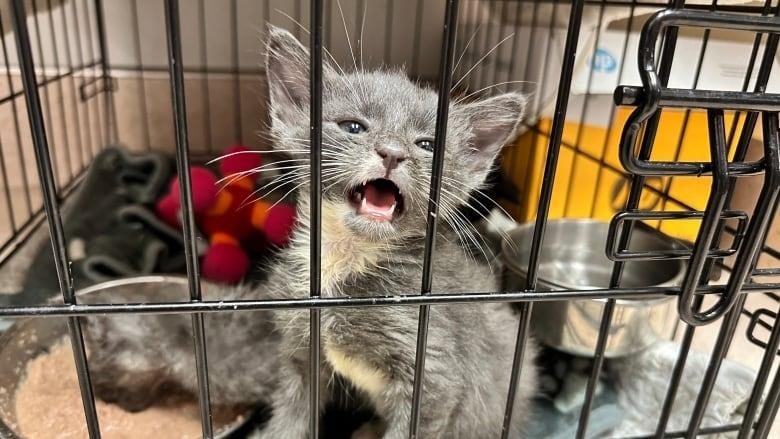
Animal shelters are begging for help because more animals are being left alone
The number of cats and dogs being given up by their owners is rising at a rate that has never been seen before. This is causing a capacity crisis at pet rescue centers all over Alberta.
The rise in unwanted pets is putting a strain on shelters, making rescue workers’ jobs harder, and making people more worried that unwanted animals will be neglected.
People on the front lines warn that some pet owners are giving up their animals because they can’t find shelters that can take them.
Communities all over the province are dealing with the crisis because shelters are always too full. The trend started when COVID restrictions were eased, and it has grown along with the cost of living.
Dan Kobe, a spokesman for the Alberta SPCA, said that the society’s workers have noticed a worrying rise in the number of animals whose owners have given them up.
“They want to give them up, but they can’t find a good place to do so. So, when they’re desperate, they leave the animal in a place where they hope it will be taken care of… “But the animal is still in a dangerous situation,” Kobe said.
“We don’t want people to do something that extreme.”
All over the province, shelters are full. He said that there are too many pets and that it is getting more expensive to take care of them.
He said, “We’d like people to take the time to give up animals the right way, even if it takes weeks or months.”
“Now that you are taking care of that animal, it is your job to make sure it gets to its next home safely.”
‘Desperate measures
Erin Deems, the head of the Saving Grace Animal Rescue Society in Alix, 55 kilometers northeast of Red Deer, said that there is no longer enough room to take in all the animals that are being given up.
“On any given day, we have too many people,” she said. “Unfortunately, people are now so desperate that they are just leaving them on our doorstep.
Officials at the shelter say that this trend, which has been seen all over Canada, is caused by several things. Animal adoptions went up when COVID-19 was at its worst, but they went down when restrictions were eased.
Many people who got pets while they were stuck in their homes because of rules no longer have time to take care of them. During the pandemic, there were a lot of backyard breeding operations, which are now filling up the shelter system with unwanted litters.
With inflation going up, the problem is getting worse. Some people can no longer afford their pets or can’t find affordable places to live that will let them keep them.
Deems said that Saving Grace is having trouble keeping up with how many people want to use its services. It has a shelter for more than 80 animals, and another 200 are living in foster homes.
Up to 15 calls a day come in from people who want to give up their animals. Most people aren’t being let in.
“We’re doing a triage system,” said Deems. “But we can’t take in anyone who isn’t in an emergency because we don’t have the money to take care of them. There’s just not enough room.”
Staff is trying to give priority to the most vulnerable animals, but each new case pushes the society further past its capacity and puts more pressure on its small budget, Deems said.
Due to lack of space, Edmonton’s Infinite Woofs Animal Rescue stopped taking in animals from the public about a year ago.
Treasurer Lori White said that about 30 people call the rescue every day to give up their pets.
Infinite Woofs recently took in the last of a litter of five kittens that had been dumped in a ditch next to a highway.
Rescue workers say they are hearing more and more reports like this.
“How does a person get to the point where their only action is to throw a bunch of helpless kittens out of a car?” White inquired.
“Did they try to find help? Did they try to get them to turn themselves in somewhere else and keep getting turned down? It’s really hard.
“We’re living in a circle of bad things right now.”
Amanda Annetts, a program coordinator at Edmonton’s Second Chance Animal Rescue Society, said that on average, staff now get 10 requests for pets to be given up every day. This is three times as many as before the pandemic.
“Some people call us and cry and beg us to help them. But there isn’t enough room.
“We try to say ‘yes’ as often as we can… We don’t know where the animals go when we say “no.” It’s a terrible thing.”
The society is taking care of more than 500 animals at its shelter in Morinville. This is more than double the normal number and the most animals the organization has ever taken care of.
“The situation in Alberta is so bad right now that every rescue group is begging for help, and there doesn’t seem to be any way out,” Annetts said.
“Even if you get more donations and adopt more animals, you’ll still have the problem of strays coming in.”
Rescue workers say that more laws against backyard breeders and better access to low-cost veterinary services, especially programs that help pay for spaying and neutering, would help ease the pressure.
Annetts said that the trend is also caused by a lack of education. Too often, pets are treated like they don’t matter.
“The number one thing that will get rescues out of this situation is responsible pet ownership,” she said.
“People need to be ready so they can take care of their pet for the rest of its life.”
